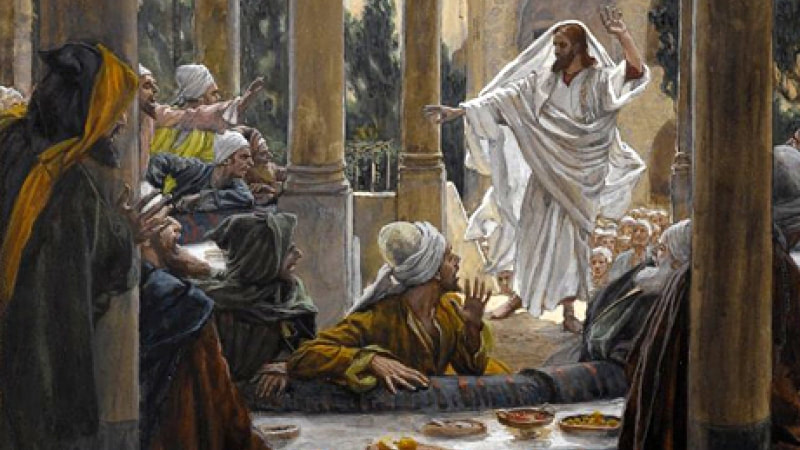
The avaricious man does not seek first the kingdom of God and His justice; what he seeks and desires is money and goods; he thinks only of them. He violates Christian charity and justice; he oppresses the poor, widows and orphans when there is a question of gratifying his avarice.
Children, understand me, to be rich and to be avaricious are not one and the same thing. Abraham, Isaac, Jacob, Job and David were rich, but not avaricious. They were holy men. There are rich people who are not avaricious, and there are poor people who are very avaricious. Only those who inordinately seek and love money and other worldly goods are avaricious.
A merchant named William made a long journey into a distant country, acquired a large fortune by his industry and skill, and after many years returned to his native country. Just as the ship arrived, he heard that all his relations were assembled at a merry supper party in a near-by country house. He immediately hurried to it, and, in the joy of his heart, did not even take time to exchange for a better coat his traveling dress, which had grown rather shabby in the course of the voyage. The consequence was that, as he came into the brilliantly-lighted room, his fine cousins showed but little pleasure at seeing him back again, imagining from his shabby apparel that he had returned home poor. A young servant whom he had brought with him was indignant at the conduct of these relations. "What a heartless set!" said he, "who do not even give their friend a hearty welcome after so long an absence/' "Just wait a moment," said the merchant to him, in a low voice; "they will soon show a different countenance."
He then put a precious ring, which he carried with him, on his finger; and, lo! all their countenances brightened up, and each pressed towards "dear Cousin William." One took him by the hand, another embraced him, and all contended for the honor of receiving and entertaining him at their houses. "Can it then be," said the astonished servant, "that the ring has some hidden power to bewitch the people?" "Oh, no," said William, "it is only that they see by the sparkling ring, which is worth some thousand dollars, that I am rich; and riches rank above everything else in their eyes." "Oh! you blinded men!" cried the boy; "it is not, then, the ring, but your own avarice, that has bewitched you! Can it, indeed, be that men should prize a bit of yellow ore and a brilliant stone more highly than a man so noble as my master?" How many a silly fool worships wealth and is blind to virtue!
We must always be on our guard, dear children, against the hateful and contemptible vice of avarice, which is the fruitful source of so many evils, and we should be the more watchful because it is apt to grow upon people without their perceiving it, especially as they acquire wealth and advance in years. Your parents, dear children, should take every opportunity of promoting liberality in you, teaching you to be generous to your companions, and to love above all things Christ's poor ; otherwise your parents will see you grow up mean, selfish and miserly. You should always remember the words of our divine Lord that He has promised on His own divine word, that even a cup of water given in His name shall not lose its reward.
We have a terrible example of the fatal consequences of 'avarice in the traitor Judas, who, for the few paltry pieces of silver, betrayed His divine Master. On the other hand, it was the charity of Tobias which obtained for him the visit of the archangel Raphael and many blessings, both spiritual and temporal.
Again, it was the hospitality which the woman of Sunam showed to the prophet Eliseus that merited the restoration of her son to life.
A rich miser, who had never given a penny to a poor man, kept a monkey for his amusement; but this monkey he even hoped to sell again for more than he had cost. One day this hardhearted man had gone out. The ape got his paws upon the well-filled money chests, and threw whole handfuls of gold and silver out of the window into the street. The people who saw this ran to pick the money up; they scrambled and fought for it and gathered up as much as they could. At length, when the chests were almost empty, the miser came up the street and saw with horror what was going on. "Oh! you hideous, stupid brute!" he cried out, threatening the ape with his clenched fist. A neighbor, however, said to him in the midst of his fury : "Keep your temper. It is certainly stupid to throw money out of the window like this monkey; but, pray, is the man more reasonable who locks it up in chests and makes no use whatever of it ? See how God punished the avaricious man by the means of a stupid animal!
Children, there is a great difference between a proper and an inordinate love of money. He who properly loves money has not the money itself in mind, but the proper use of it; he would be quite indifferent to it if he could not make use of it. Money is to him what medicine is to a sick man. He loves medicine because thereby he hopes to gain a benefit. On the contrary, he who loves money for money's sake, has only the money and not the use of it in view; the possession of money gives him great pleasure.
Thus the rich merchant, of whom Caesarius relates that his friends were obliged to promise him that they would bind a purse of gold upon his heart and put it into the grave with him, certainly loved money. Thus the Emperor Caligula loved money; he often rolled himself on it with great satisfaction. Many Catholics have indeed no purse bound upon their heart, nor do they roll themselves upon their money, but their hearts and souls cling to it; their most pleasant hours are spent in counting their money. The rich man may lose all his wealth by misfortune, and be reduced to beggary during his lifetime; but death tears from man all he possesses. Suppose a man has boxes full of gold, death will not leave him a cent; suppose he owns houses and lands, nothing remains for him but the coffin, in which his body is laid, and a few feet of clay in which he moulders.
The Emperor Constantine one day demonstrated this truth to one of his officers, to cure him of his inordinate love of money. He marked out with his sword on the surface of the ground a space six feet long and two feet wide, and then said to him: "This is all that finally remains for us, my friend ; why should we labor so much to gather riches ?"
Children, often think of this story when you have a desire for the riches and pleasures of the world. 'That is all that will remain to me in death." Remember, man is made for heaven, his eyes look towards heaven. Give a horse a bundle of hay, and a dog a piece of meat, and they are satisfied and wish for no more. The heart of man is made for love and union with God and will never find rest in sensual enjoyments. In spite of his millions the heart of the avaricious man feels disquieted.
A miser had hidden with care a large sum of money in the hollow of a rock. A father of a family, in despair at the want of his children, betook himself to that spot, with the intention of hanging himself with a rope he carried for that purpose. Of a sudden he felt the ground yielding beneath him, and he fell into the hollow which the miser had dug out. After recovering from his fall, he found the treasure hidden there, and took it off as a present from heaven. Later on the miser came to contemplate his gold; finding it gone, he hanged himself with the rope the other had left behind him.
My dear boys and girls, as Christians and followers of Jesus Christ, we must consider that when He came down from heaven upon earth that He would not possess any riches, which you so greedily desire; nay, He loved poverty so much that He chose to be born of a poor and lowly virgin, and not of a rich princess of the earth. When He came into the world He would not live in a magnificent palace, but in a miserable manger where rough straw touched His tender body. Moderate your desires for earthly goods which are vain and frail. Your divine Judge will ask you what you have done for heaven, not what you possessed of the goods of this world. Endeavor to be rich in virtues and good works; these are true treasures, far more precious than all the gold and silver of the world.
Source: Story Sermonettes for the Children's Mass, Imprimatur 1921
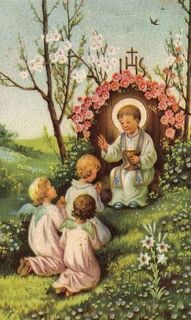
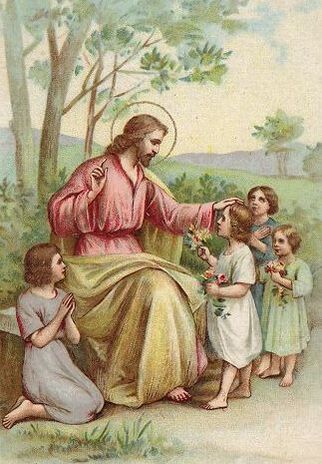
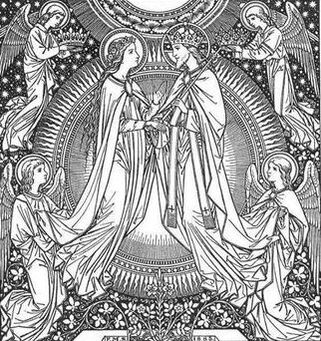
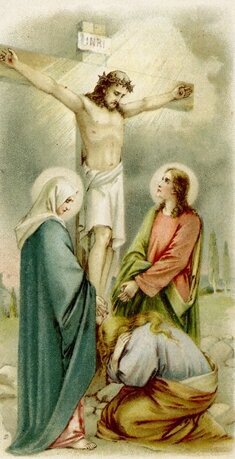


 RSS Feed
RSS Feed